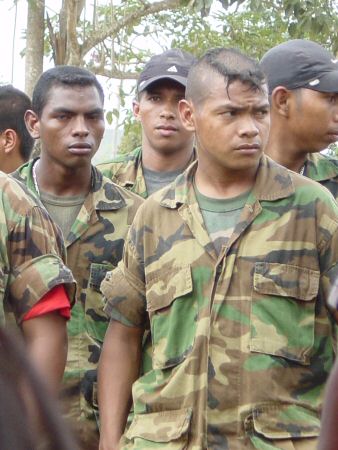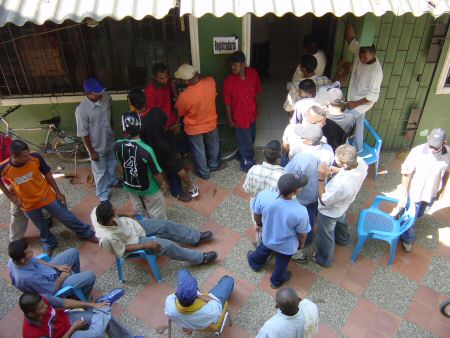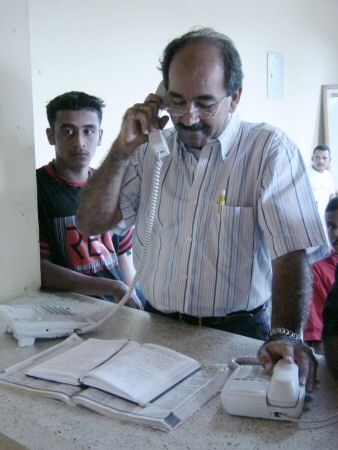« They can't be serious | Main | Uribe and the UN »
May 19, 2005
The Reference Center in Montería
(CIP's Colombia Program welcomes a new Senior Fellow to its staff, Winifred Tate. This is her first posting to "Plan Colombia and Beyond.")
In the past eighteen months, almost 5,000 people have participated in a series of collective paramilitary demobilizations. Despite this large number, plans for their reintegration remain alarmingly vague.
 |
| Members of the Norte Bloc await their demobilization. |
The government promises legal identity documents, a two-year subsidy, and educational and employment opportunities to anyone participating in the process who does not face pending legal charges. Much of the international attention on paramilitary demobilization efforts has focused on judicial issues, and the lack of a legal framework to settle cases of serious human rights abusers. While these are obviously serious concerns, there has been little attention paid to monitoring the thousands of people who have already passed through the demobilization process.
Reintegration is the final phase of demobilization, and involves helping combatants (and their families) adapt to civilian life. Most reintegration programs involve some combination of economic assistance, job training and educational projects.
According to the High Commissioner for Peace, demobilized individuals are expected to travel back to their communities of origin. Programs to help these communities address the influx of demobilized individuals are still in the planning stage.
The High Commissioner for Peace has determined that each demobilized individual will receive a government stipend of 358,000 pesos a month (roughly US$155, slightly lower than Colombian minimum wage) for two years. They will also be eligible for subsidized classes through the SENA (the Servicio de Aprendizaje Nacional), a public technical training school offering classes ranging from basic construction to auto mechanics, and possibly future assistance with productive projects such as setting up small businesses. None of the private-sector employment projects have been implemented, however.
Benefits will be provided through Referral and Opportunity Centers (Centros de Referencia y Oportunidades, or "Reference Centers") set up in the communities where demobilized individuals live. Each Center has three or four people on staff who are responsible for dealing with hundreds, in some cases thousands, of demobilized individuals.
 |
| At the Montería Reference Center demobilized members of the Calima and Catatumbo Blocs wait in line to obtain legal identification cards. |
To date, there is no way to track where demobilized individuals end up living, or what they end up doing. With USAID support, the International Organization for Migration has been developing a computerized monitoring system to monitor demobilized individuals and facilitate follow-up interventions, but the system is still in development and has yet to be fully implemented.
The Reference Center in Montería, capital of the paramilitary-dominated province of Córdoba, was opened on November 29. Charged with providing benefits and assistance to more than one thousand demobilized individuals, this center has four people on staff: the coordinator (a former businessman), an intake worker, a general assistant and messenger, and a psychologist.
When I visited the Center on January 17, the morning before the demobilization of the Norte Bloc, the Center was filled with angry, shouting demobilized men from the Catatumbo and Calima Blocs who had returned to their home communities in Montería. Because of problems during the demobilization phase, most had not received the proper identification paperwork and their benefits had been delayed. According to the men in the crowd, they had been told the previous week that the money would arrive before the end of the week, but now – on Monday morning – they wanted some answers.
The men gathered in a downstairs meeting room, and shouted demands at the Center’s coordinator. “You get paid on time,” one man shouted, “the government always sends your salary, you have money to pay expenses for your family, you have money to put food on the table.” Others contrasted their treatment while in the paramilitaries with their current conditions. “We got paid all the time, on time, before,” several exclaimed. “We had doctors to take care of us, and always got paid, not this red tape (papeleo), now we get nothing but problems.” Their discontent quickly translated into threats to return to fighting with the paramilitaries. “If things go on like this, and the government no doesn’t fulfill their promises, we’ll go back to the paramilitaries again,” several shouted. “Why would we stay here?”
 |
| The Montería Reference Center coordinator works the phones. |
The coordinator calmed the crowd with promises that representatives from the SENA’s education programs would be there shortly. He later explained that he was not surprised by the crowd’s anger. “All the complaints are a normal reaction,” he said. “Given the people involved, it is not unusual that some would be discontented with the subsidy. There have been errors on all sides, we should have been more organized, and they need to understand that there will be issues in the process, issues that will be resolved.”
Because of the high percentage of members from Urabá and the northern Antioquia and Córdoba region (where the AUC was founded), towns in this area – including Montería – will receive a disproportionately high number of demobilized individuals. Hundreds of members of the Catatumbo Bloc and the Calima Bloc have returned to Montería, and the majority of the 936 members of the Norte Bloc will remain in town. During a visit to the Reference Center, several expressed concern about the town’s ability to absorb so many unemployed men. “The reasons we left, unemployment and no opportunities, have not changed,” said one demobilized former member of the Catatumbo Bloc.
One demobilized member of the Catatumbo Bloc described his history in the paramilitaries. He first got involved through his brother. With only a fifth grade education and three young children, he made between Col $600,000 (US $254) and Col $700,000 (US $296) per month in the paramilitaries. “So this Col $358,000 (US $155) a month from the government isn’t good enough, it is not enough to get by,” he told me.
He went on to note another issue with the demobilization: no one in the group had been aware of the high level negotiations arranging the process. “They just called us one day and told us,” he said. Internal dissent over the process went deep among the paramilitary forces. “Some are tired of the war and they want to get out, but a lot think the war should go on, that they’ve found their thing and are doing well. A lot will go back. Many already have problems. In Cúcuta, some have already been killed, I asked about a friend of mine, one guy, and they told me he was already dead.”
Comandante Andrés, a senior commander from the Norte Bloc, echoed these concerns in an interview in the pre-demobilization camp set up in Santa Fe de Ralito. “A big problem is the issue of salaries,” he said. “Before [in the paramilitaries], the lowest level of salaries was Col $400,000 (US $170) a month, the most was Col $2 million (US $847), there are different levels. From the government they only get Col $358,000 (US $155) a month, and that is all people get. So it is starting off bad, because people have problems, maintaining their families and paying for their needs. So if people are really going to stay out of the war, that is another issue.” He went on to question the lack of psychological preparation programs offered by the government. “I don’t think a short talk for one hour to send them off to civil society is exactly adequate.”
Posted by Winifred Tate at May 19, 2005 12:44 PM
Trackback Pings
TrackBack URL for this entry:
http://ciponline.org/cgi-bin/mt-tb.cgi/90
Comments
It's an interesting yet at the same time very worrying view of the situation, Mrs. Tate, looking forward to reading/discussing more of your CIP posts in the future.
The matter at hand is partially related to the lack of a legal framework in the sense that, without such an element in place, it's hard for the U.S. (which also has additional difficulties in dealing with its own Patriot Act as far as "supporting" demobilized "terrorists" is concerned), the UN, and/or European contributors to actually try and help the Colombian government to effectively handle these important concerns (and finance them as well), which are definitely a key part of the process.
Who knows, though, what road could any later developments take, considering that current perspectives are rather bleak.
Posted by: jcg at May 20, 2005 12:47 AM
Post a comment
Thanks for signing in, . Now you can comment. (sign out)
(If you haven't left a comment here before, you may need to be approved by the site owner before your comment will appear. Until then, it won't appear on the entry. Thanks for waiting.)